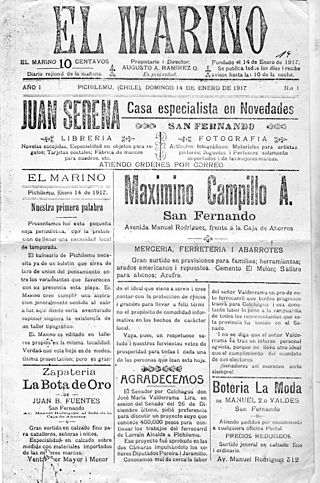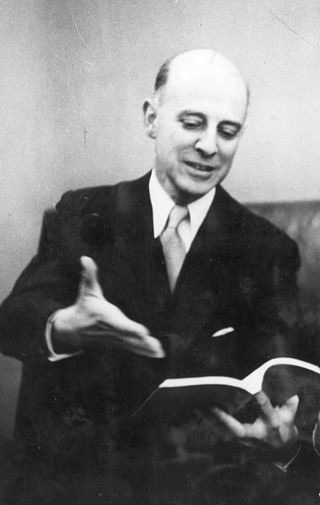
The Changos, also known as Camanchacos or Camanchangos, are an Indigenous people or group of peoples who inhabited a long stretch of the Pacific coast from southern Peru to north-central Chile, including the coast of the Atacama desert. Although much of the customs and culture of the Chango people have disappeared and in many cases they have been considered extinct, in Chile they are legally recognized as an original indigenous people since 2020, and about 4,725 people self-declare that they belong to this ethnic group.

Cueca is a family of musical styles and associated dances from Chile, Argentina, and Bolivia. In Chile, the cueca holds the status of national dance, where it was officially declared as such by the Pinochet dictatorship on September 18, 1979.
The Battle of Curalaba is a 1598 battle and ambush where Mapuche people led by Pelantaru soundly defeated Spanish conquerors led by Martín García Óñez de Loyola at Curalaba, southern Chile. In Chilean historiography, where the event is often called the Disaster of Curalaba, the battle marks the end of the Conquest of Chile period in Chile's history, although the fast Spanish expansion in the south had already been halted in the 1550s. The battle contributed to unleash a general Mapuche uprising that resulted in the Destruction of the Seven Cities. This severe crisis reshaped Colonial Chile and forced the Spanish to reassess their mode of warfare.

This is a timeline of Chilean history, comprising important legal and territorial changes and political events in Chile and its predecessor states. To read about the background to these events, see History of Chile. See also the list of governors and presidents of Chile.

Maullín River is a river of Chile located in the Los Lagos Region. The river originates as the outflow of Llanquihue Lake, and flows generally southwestward, over a number of small waterfalls, emptying into the Gulf of Coronados. The lower course of the river is a tidal estuary. The wetlands of Maullín stand out for their diversity of aquatic birds when compared to other locations of the Chilean coast. In the estuary Laguna Quenuir is the place known to have the largest diversity of bird fauna.

The National Archives of Chile is a public organization of the Chilean state, created in 1927 with the goal to "collect and conserve the archives of the Departments of State and all the documents and manucsrpits related to the national history, and to oversee their organization and use". It is treated as a dependent organization of the Dirección de Bibliotecas, Archivos y Museos, which is administered by the Consejo Nacional de la Cultura y las Artes de Chile.

Chilean literature refers to all written or literary work produced in Chile or by Chilean writers. The literature of Chile is usually written in Spanish. Chile has a rich literary tradition and has been home to two Nobel prize winners, the poets Gabriela Mistral and Pablo Neruda. It has also seen three winners of the Miguel de Cervantes Prize, considered one of the most important Spanish language literature prizes: the novelist, journalist and diplomat Jorge Edwards (1998), and the poets Gonzalo Rojas (2003) and Nicanor Parra (2011).

Criollismo is a literary movement that was active from the end of the 19th century to the beginning of the 20th century throughout Hispanic America. It is considered the Hispanic counterpart to American literary regionalism. Using a realist style to portray the scenes, language, customs and manners of the country the writer was from, especially the lower and peasant classes, criollismo led to an original literature based on the continent's natural elements, mostly epic and foundational. It was strongly influenced by the wars of independence from Spain and also denotes how each country in its own way defines criollo.

In Chilean historiography, Colonial Chile is the period from 1600 to 1810, beginning with the Destruction of the Seven Cities and ending with the onset of the Chilean War of Independence. During this time, the Chilean heartland was ruled by Captaincy General of Chile. The period was characterized by a lengthy conflict between Spaniards and native Mapuches known as the Arauco War. Colonial society was divided in distinct groups including Peninsulars, Criollos, Mestizos, Indians and Black people.

Antonio Acevedo Hernández was a Chilean writer. Hernández was a self-taught novelist, playwright and writer whose works include theater, novels, short stories, literary and journalistic chronicles, essays, poetry and popular Chilean folklore. He created over 840 works, including the plays Almas perdidas,El Vino triste,La Sangre, and El Rancho. He was awarded the Premio Nacional de Teatro in 1936. His work, along with that of authors like Germán Luco Cruchaga and Armando Moock, marked the beginnings of Chilean dramaturgy.

Inés Echeverría Bello was a Chilean writer and feminist.

El Puerto was a biweekly newspaper published in Pichilemu, Chile, by San Fernando newspaper editor Augusto A. Ramírez O.. El Puerto was only published in three issues: the first on 16 January and the last on 5 February 1908. It was the first newspaper published in the commune of Pichilemu, and aimed to be an "absolute and exclusive organ to the regional interests of Colchagua, especially [those] of the port of Pichilemu." El Puerto included a scientific section written by a physician, chronicles, and literary content such as poems.
As an archaeological culture, the Mapuche people of southern Chile and Argentina have a long history which dates back to 600–500 BC. The Mapuche society underwent great transformations after Spanish contact in the mid–16th century. These changes included the adoption of Old World crops and animals and the onset of a rich Spanish–Mapuche trade in La Frontera and Valdivia. Despite these contacts Mapuche were never completely subjugated by the Spanish Empire. Between the 18th and 19th century Mapuche culture and people spread eastwards into the Pampas and the Patagonian plains. This vast new territory allowed Mapuche groups to control a substantial part of the salt and cattle trade in the Southern Cone.

El Marino was a Chilean daily newspaper, based in Pichilemu, Cardenal Caro province. It was founded on 14 January 1917 by newspaper editor Augusto Ramírez Olivares, and circulated between January and March 1917.

Jaime Eyzaguirre was a Chilean lawyer, essayist and historian. He is variously recognized as a writer of Spanish traditionalist or conservative historiography in his country.
In Colonial times the Spanish Empire diverted significant resources to fortify the Chilean coast as consequence of Dutch and English raids. The Spanish attempts to block the entrance of foreign ships to the eastern Pacific proved fruitless due to the failure to settle the Strait of Magellan and the discovery of the Drake Passage. As result of this the Spanish settlement at Chiloé Archipelago became a centre from where the west coast of Patagonia was protected from foreign powers. In face of the international wars that involved the Spanish Empire in the second half of the 18th century the Crown was unable to directly protect peripheral colonies like Chile leading to local government and militias assuming the increased responsibilities.

Olga Viktorovna Ulianova Ольга Викторовна Ульянова was a Russian historian, born in the Soviet Union, naturalized Chilean. She specialized in contemporary history, Cold War, Chilean communism and the international non-state networks.

The Defensive War was a strategy and phase in the Arauco War between Spain and independent Mapuches. The idea of the Defensive War was conceived by Jesuit father Luis de Valdivia who sought to diminish hostilities, establish a clear frontier and increase missionary work among the Mapuches. Luis de Valdivia believed the Mapuches could be voluntarily converted to Christianity only if there was peace.

Banditry was a considerable phenomenon in 19th century and early 20th century Central Chile and Araucanía. Many bandits achieved legendary status for their brutality and others for being regarded folk heroes. The bandits usually preyed on haciendas and their inquilinos.

María Griselda Hinojosa Flores was a Chilean pharmacist. She became the first woman to practice pharmacy in the country after earning a degree from the University of Chile in 1899.

















